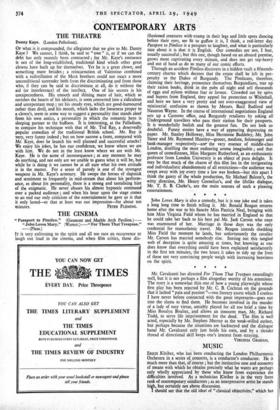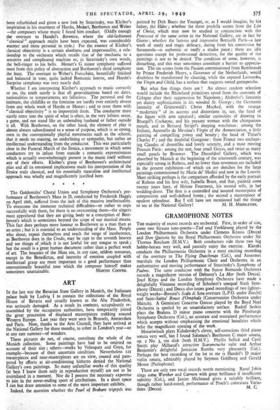MUSIC
ERIC.H Kleiber, who has been conducting the London Philharmonic Orchestra in a series of concerts, is a conductor's conductor. He is much more than that, of course ; but the instinctive ease and economy of means with which he obtains precisely what he wants are perhaps only wholly appreciated by those who know from experience the difficulties involved. As a technician Kleiber is in the very front rank of contemporary conductors ; as an interpretative artist he stands high, but certainly not above discussion.
I should say that the old ideal of "classical 'objectivity," which has been refurbished and given a new look by Stravinsky, was Kleiber's inspiration in his treatment of Haydn, Mozart, Beethoven and Weber —the composers whose music I heard him conduct. (Oddly enough the overture to Handel's Berenice, where the old-fashioned "classical" approach might have been expected, was considerably warmer and more personal in style.) For the essence of Kleiber's, classical objectivity is a certain aloofness and impersonality, a rela- tionship to the orchestra which recalls that of the mechanic to a sensitive and complicated machine or, in Stravinsky's own words, the bell-ringer to his bells. Mozart's G minor symphony suffered most from this policy of abstraction and Beethoven's third symphony the least. The overture to Weber's Freischutz, beautifully finished and balanced in tone, quite lacked Romantic horror, and Haydn's Surprise symphony was very nearly dull.
Whether I am interpreting Kleiber's approach to music correctly or no, the truth surely is that all generalisations based on dates, nationalities or temperaments are fallacious. The personal and the intimate, the childlike or the feminine are hardly ever entirely absent from any whole work of Haydn or Mozart ; and to treat them with " classical objectivity " is to impoverish them. The conductor must surely enter into the spirit of what is often, in the very loftiest sense, a game, and not stand like an unbending husband or father outside it all. With Beethoven, on the other hand, the element of play is almost always subordinated to a sense of purpose, which is so strong, even in the conventionally playful movements such as the scherzi, that it needs no coaxing, no underlining or sympathy, but rather an intellectual understanding from the conductor. This was particularly clear in the Funeral March of the Eroica, a movement in which some conductors try to infuse from outside a romantic expressiveness which is actually overwhelmingly present in the music itself without any of their efforts. Kleiber's grasp of Beethoven's architectural plan and all its emotional implications made his interpretation of the Eroica truly classical, and his essentially masculine and intellectual approach was wholly and magnificently justified here.
* * The Goldsmiths' Choral Union and Symphony Orchestra's per- formance of Beethoven's Mass in D, conducted by Frederick Haggis on April 26th, suffered from the lack of this massive intellectuality. To overcome the immense technical difficulties—or rather to cope successfully with them, for there is no overcoming them—the singers must apprehend that they are giving body to a conception of Beet- hoven's which is sometimes beyond the scope of our musical means. This fact does perhaps more honour to Beethoven as a man than as an artist ; but it is essential to an understanding of the Mass. People who shout, repeat themselves and reach the verge of incoherence, as Beethoven does in the Credo, may be rapt to the seventh heaven and see things of which it is not lawful for any tongue to speak ; but the result is a great human document rather than a perfect work of art. The beauties of the Mass are, in any case, seldom sensuous, except in the Benedictus, and intensity of emotion coupled with intellectual grasp are more important to a good performance than conventionally beautiful tone which the composer himself makes



































 Previous page
Previous page